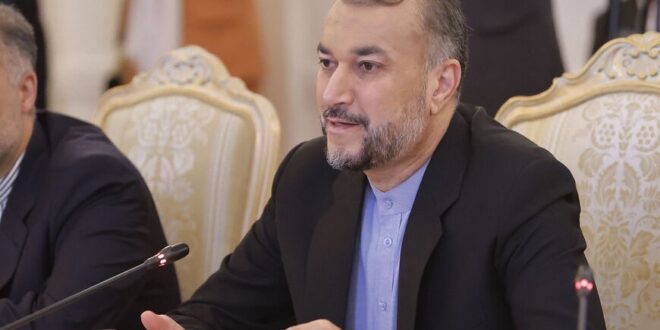Iranian news outlets are emphasizing the uncertainties facing the nuclear deal as the country’s top diplomat said more guarantees were still needed from the United States for the accord’s revival.
Iran’s Foreign Minister Hossein Amir-Abdollahian has demanded that Washington offer more robust guarantees for sanctions relief in negotiations over the resurrection of the Iran nuclear deal, the Joint Comprehensive Plan of Action (JCPOA).
The Iranian minister was referencing an official US response to Iran’s comments on an EU-drafted deal for the JCPOA’s revival. Tehran has said it is still reviewing the US answers.
“We are determined to reach a lasting agreement,” Amir-Abdollahian declared at a joint press conference with his Russian counterpart Sergey Lavrov in Moscow.
Another thorny issue in the course of the talks has pertained to outstanding questions regarding the possible military dimensions of past Iranian nuclear activities. Iran insists that the International Atomic Energy Agency (IAEA) drop its probe and declare the file closed.
“It won’t be acceptable for us that even after the return of all the JCPOA signatories to the accord, the agency continues to level baseless allegations against Iran,” Amir-Abdollahian said, calling on the IAEA to “break free from political behavior” and concentrate on its technical duties.
Following the receipt of the US response to the EU draft, some Iranian media outlets and officials have been voicing increasing pessimism.
“As Iran was serious for an agreement, it accepted the EU draft, only embedding a few minor additional conditions. But with the US response, hopes for an agreement are fading away,” said Ali Alizadeh, a senior lawmaker and a member of the Iranian Parliament’s National Security and Foreign Policy Committee.
“With the tug-of-war dragging on, the JCPOA continues to remain the international community’s most uncertain issue,” read the opening lines of an article published in the Reformist newspaper Arman-e-Emrouz on Thursday. In an interview, geopolitical affairs analyst Abolreza Faraji argued that neither Iran nor the United States are in a rush and both hope for more concessions. According to Faraji, the Democratic administration in Washington is seeking to protract negotiations on a deal until around Senate elections in November, when the announcement of JCPOA’s revival could boost the Democratic Party at the ballot box.
In the meantime, Iranian officials had yet to comment on a Reuters report based on IAEA documents that Tehran had begun enrichment with two cascades of advanced IR-6 centrifuges at the underground Natanz nuclear facility, a step that could move Tehran closer to the production of nuclear arms.
“We are able to push the [current] 60% enrichment rate to 93%, which means atomic bombs” said Esmaeil Kowsari, a senior lawmaker and a former general with the hard-line Islamic Revolutionary Guard Corps, referring to a weapons-grade level that could make Iran a nuclear state, the situation the original JCPOA was meant to thwart.
“We are not after this, but if the other party acts with delays, we do possess the capability,” Kowsari added. “It’s them who need us now.”
 Eurasia Press & News
Eurasia Press & News



